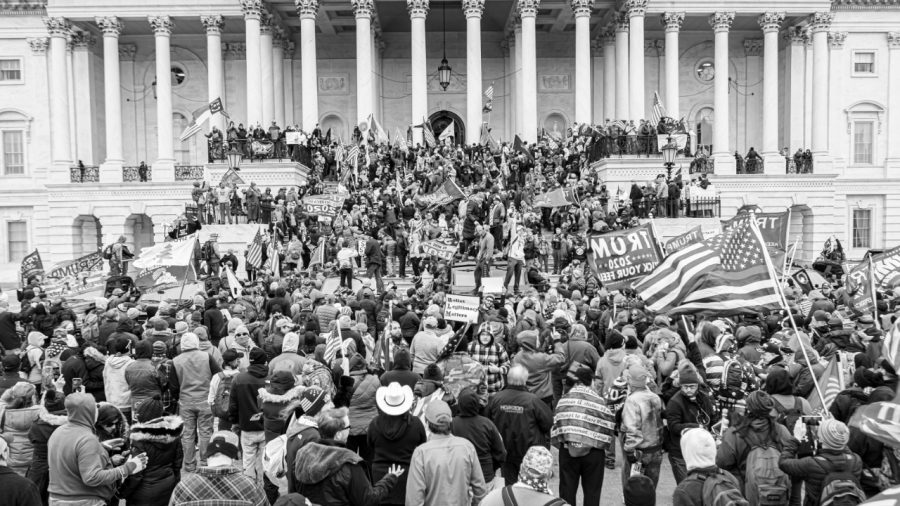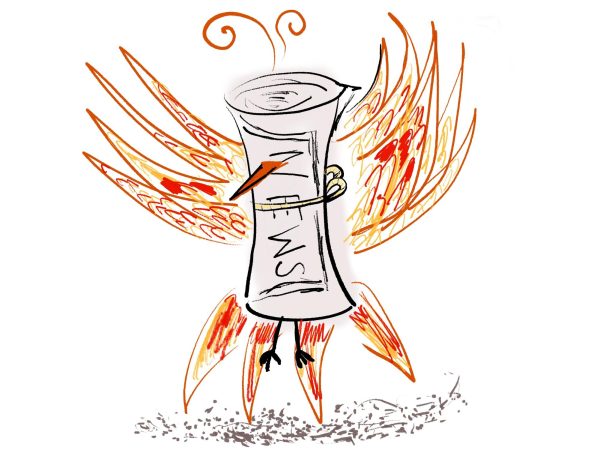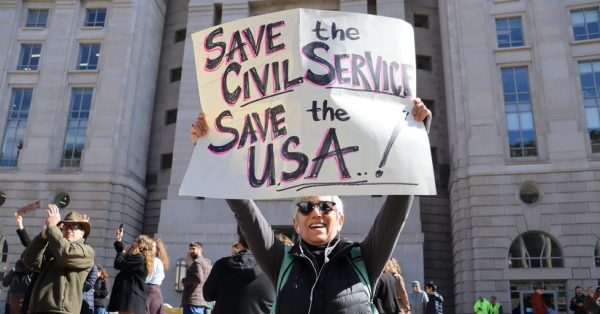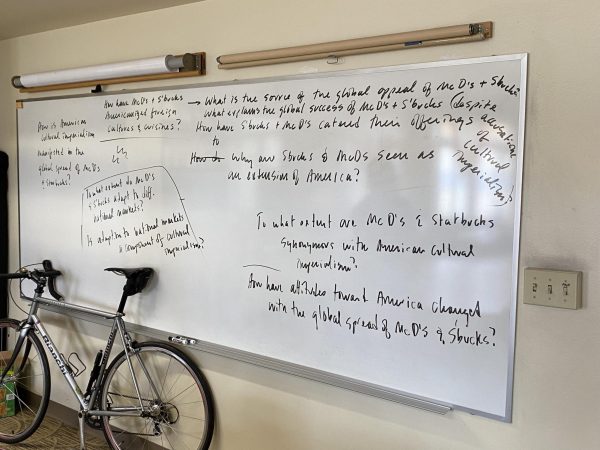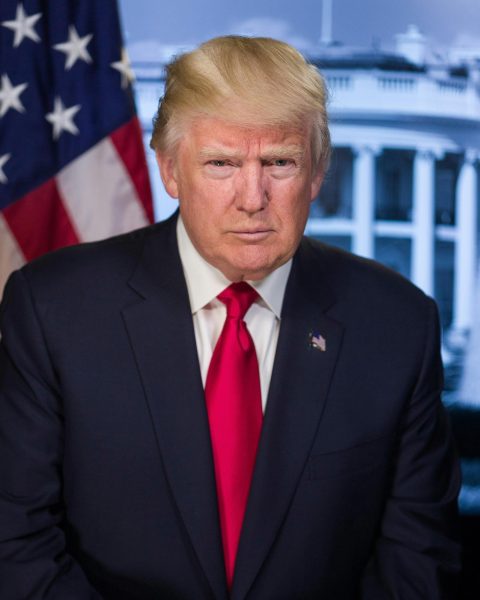We Hold These Truths to Be…
Democracy rests on the government’s transparency — corrupt politicians are abusing this now more than ever
Democracy is a fragile being, especially in the United States — a nation with a rich history of political engagement. A recent example of this fragility is the January 6 United States Capitol attack, where supporters of former President Trump tried to reverse a democratic election to keep Trump in office
Red, white, and blue. Stars and stripes. American democracy and freedom. Our nation has golden ideals, but sees political turmoil everyday. From corrupt leaders to political violence, perhaps the fragility in our nation lies in the United States’ foundation itself: democracy.
Democracy was first born in ancient Greece around the fifth century B.C.E. The Greek idea of democracy required all adult male citizens to take an active part in the government, meaning there was no gap between the government and the people. Thus, there was no opportunity for the government to be non-transparent, and abuse of power was not a problem.
But it is a problem today.
At its core, democracy, while appealing because of its representation of the general public, is a fragile enterprise. It relies on an almost unnatural transparent relationship between the government and people to be successful. It is unnatural because it can easily be abused by people in positions of power, that’s just human nature. The idea of transparent cooperation between the government and the people has been especially challenged in recent years by non-transparent politicians, and trusting followers. Take the Trump era, for example: did it damage or preserve American democracy?
While President Donald Trump did not damage democracy to unprecedented levels, his willingness to deceive his followers into believing that the election was rigged and enabling his supporters to take matters into their own hands by storming the Capital Building shows that democracy is inherently vulnerable at its core. When people are convinced to lose trust in our institutions, our government can be seriously vulnerable. The insurrection on January 6, 2021 demonstrated that if politicians exaggerate the truth and abuse the power of their position, democracy can and will be damaged.
History and Economics Teacher Mr. John Nagler said, “January 6 exposed that democracy, republicanism, and American ideas aren’t guaranteed.” He pointed to an article by Timothy Garton Ash in the February 23 issue of The New York Review which he agrees with. It suggested that democracy and freedom were human creations, and they would only survive if “constant human effort, attention, and willpower” were present.
But if politicians are not transparent, they can manipulate that human effort to preserve democracy in their favor.
Recently, for example, New York’s 3rd Congressional District U.S. Representative George Santos lied extensively about almost all aspects of his life: his career: where he attended college and his religion. Santos altered his entire life just to manufacture an appealing platform for the 2022 Midterm Elections, which ended up winning him a seat in Congress.
As with Trump, the Santos incident showed that people can properly engage in the democratic process (educate themselves on candidates and vote for the more fit politician), but democracy can still be shattered. Santos was properly voted into power democratically, but his lack of honesty and transparency while campaigning manipulated the democratic process into allowing his ascend to power in a dishonest manner.
Santos revealed that the foundation of democracy, which centers on a transparent relationship between the people and the government representing them, is vulnerable to manipulation if politicians lie. Without cooperation between the governed and the government, democracy will not function properly.
Government dishonesty mirroring Trump and Santos has escalated recently, but it is not a new occurrence. Since after World War II, the Pew Research Center has polled thousands of citizens’ trust in the government. The results show that perhaps America’s War on Terror post-9/11 contributed to a sharp decline in public trust and a growing dishonesty from those in power.
According to Pew Research Center, in 2001, 60 percent of those polled said they trust the government. But by 2011, public trust in the government was at an all-time low of 20 percent. Interestingly, at the same time period, a Pew Research Center study found that then-President George W. Bush’s approval rating changed from a soaring 75 percent in 2001, to 24 percent when he left office in 2009.
These two data points are not a coincidence. Bush’s presidency was the same time as the start of America’s nearly 20 year-long war in Iraq. Assistant Head of School and former history teacher Mr. Brian Ogden explained, “when we invaded Iraq, we didn’t find these weapons of mass destruction that had justified the invasion because it turned out Saddam Hussein didn’t have any.” The lies shared by the Bush Administration “significantly eroded public trust” as Mr. Ogden put it.
Because the Bush Administration was not transparent about the reasons to enter Iraq — justifying the invasion with inaccurate information — the public did not trust the government or the democratic process, as shown in the 40 percent dip during Bush’s presidency. This showed that democracy enables those in power to abuse their power through being non-transparent to push their agendas. When the government is not transparent, then democracy fails: it relies on the mutual cooperation between the governed and the government, with full transparency.
The most significant way the government is held accountable is through the First Amendment Right to the freedom of the press. Nirvana Shiwmangal (‘25), an avid consumer of the press and well-researched in America’s relationship with the 1st Amendment, commented on the importance of freedom of the press. “It gives every person access to information, and when people have more information they can be more educated on topics, make informed political decisions, and hold the government accountable,” she said.
However, in recent years, the increasingly bipartisan politics in America has leaked its way into the press, and the reliability of objective reporting fell. According to the Reuters Institute, as of 2021, the U.S. places last in citizens’ trust in their press compared to 45 other major world powers, sitting with only 29 percent trust. This is frightening – if the press can’t even be trusted to hold the rulers in power accountable for their actions, then the gap between the people and the government will only grow, and democracy will be further abused.
Thus, democracy is a vulnerable system, no doubt — dependent on the impractical cooperation and transparency between its citizens and people. However, despite its fragile foundation, American democracy can overcome its current difficulties and remain a beacon of freedom for people everywhere.
For this to happen, the government must work better to be transparent and also administer consequences to those who abuse democracy’s fragility. Besides the government, the American people must also better use their intelligence rather than party loyalty to make political decisions and actions.
Then — and only then — will American democracy prove to be capable of creating and sustaining a nation where life, liberty, and the pursuit of happiness are always possible for everyone, everywhere, every day of their lives.

Ben is a senior and Editor-in-Chief of The Tower. This is his fourth year on staff and second year as an editor, having previously been Graphics Editor....


